Vaginas, uteruses and coat hangers: Abortion advocates use tattoos to protest Roe v. Wade ruling
When Maiah Bennett of Eureka, California, met a female friend recently to lament last month's overturning of Roe v. Wade and discuss how to express their frustrations through art, it wasn't long before they decided it would be through Bennett's tattoo pen.
On Friday, Bohemian Tattoo, the shop where Bennett works in Eureka, held a flash sale featuring 10 images the friends had designed. Among them were variations on a uterus – including a fairy, a sword and multiple butterflies. In all, Bennett and another artist at the shop produced 10 pro-abortion-rights tattoos, with all proceeds – about $1,300 – going to the National Network of Abortion Funds, she said.
As a tattoo artist, Bennett knows the power her designs can have – not only for personal expression but as a means of healing for people overcoming sexual assault or facing depression.
"Tattoos are a way of taking ownership over your own body and making a statement for yourself as well as others," said Bennett, 27. "Our bodily autonomy is being stripped from us."
The U.S. Supreme Court ruling June 24 denying a constitutional right to abortion marked the culmination of a gradual clampdown on abortion access around the country, with 26 states banning or limiting or expected to ban or limit the procedure.
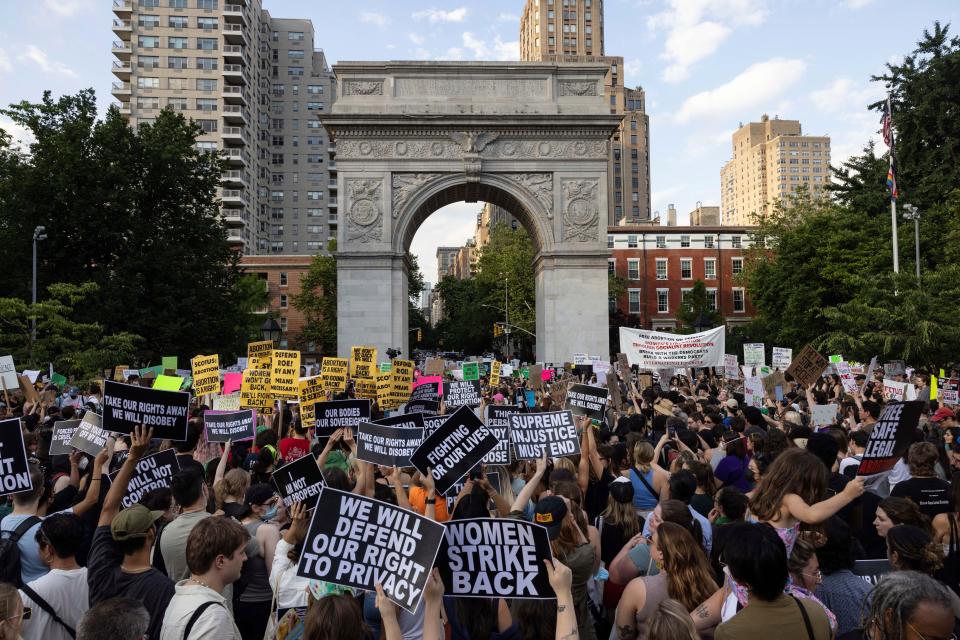
In response, some abortion rights supporters are turning to body art to vent their frustrations, state their positions and ease their grief over the loss of what they say should be a basic right. Meanwhile, artists like Bennett and others among the nation's estimated 31,000 tattoo shops are joining the cause by conducting pro-abortion-rights flash sales – one-day events offering themed designs at reduced rates – with proceeds benefiting abortion rights advocacy organizations.
The designs include a pair of underwear ringed with barbed wire, hearts reading "My Body My Choice" and coat hangers with the words "Never Again."
"It’s just important to feel heard in this time," Bennett said. "I'm hoping this will help people feel some confirmation in themselves.”
Pro-abortion tattoos show 'feminine power'
The designs weren’t the only pro-abortion-rights tattoos Bennett has done. In May, just after the leak of a draft opinion foreshadowing the Supreme Court decision, one of her customers came in and asked to be tattooed with the image of a uterus with a raised middle finger.
“She was very angry at the idea of her bodily autonomy being taken away,” Bennett said.
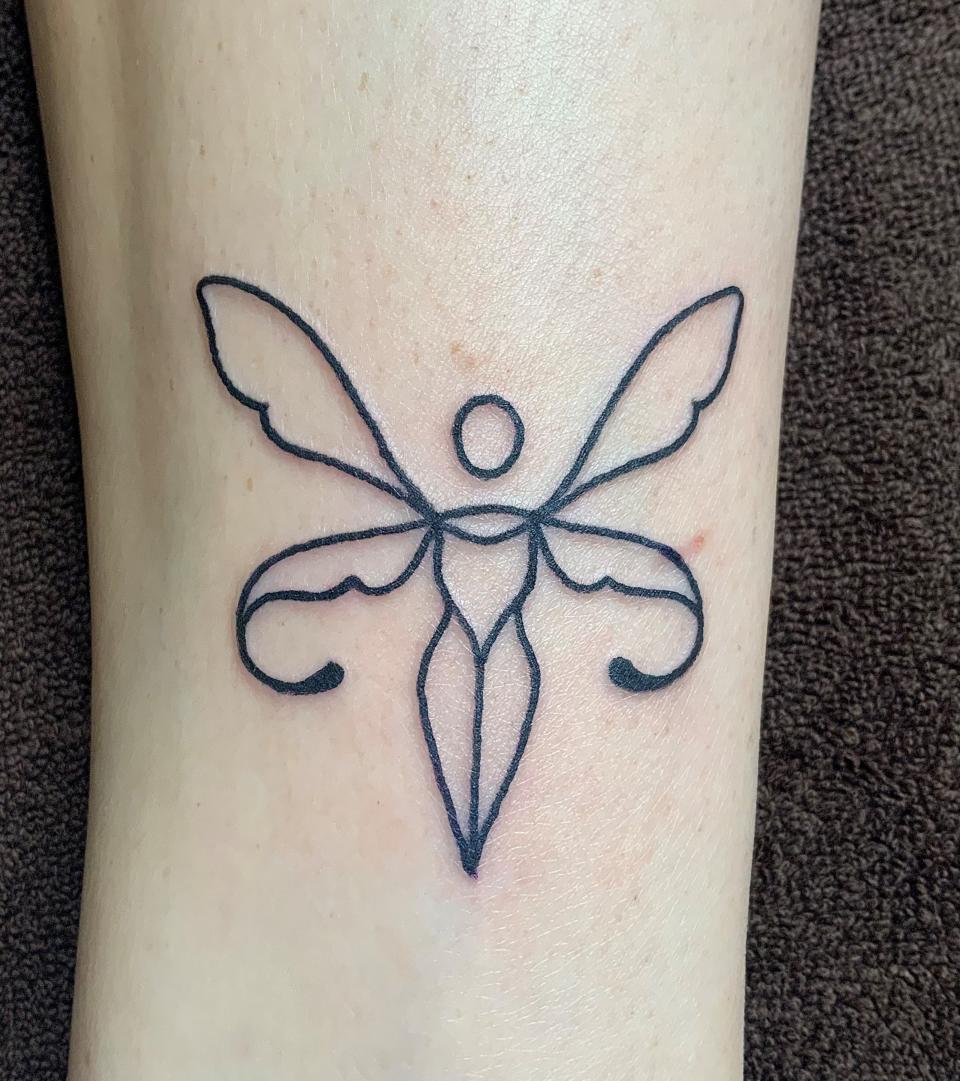
Kelly Nestman was also angry. Nestman, who owns a consulting company focused on reproductive health in Pittsburgh, said she has seen four or five local tattoo shops holding abortion access flash sales since last month's ruling.
Last week, she sought out local artist Ashley Karpa-Strang for the design she had in mind – a lush, 5-inch-long image of a vagina. The imagery is important to Nestman not only because of her career in reproductive health justice but also because, as someone with endometriosis, a disease in which tissue similar to the lining of the uterus grows outside the uterus, she has experienced her own related struggles.
“I have a lot of vaginal imagery in my house,” said Nestman, 27. “I see it as this beautiful thing, not something for folks to use as an insult. It represents feminine power in a way that is thousands of years old. There’s no way you can adequately do anything in abortion care without acknowledging a vagina.”
The image isn't Nestman's first abortion-rights-related tattoo: Six years ago, as an intern for Planned Parenthood, she had an image of a coat hanger tattooed on her wrist.
“When I shake people’s hands, I want them to know where I stand,” she said.
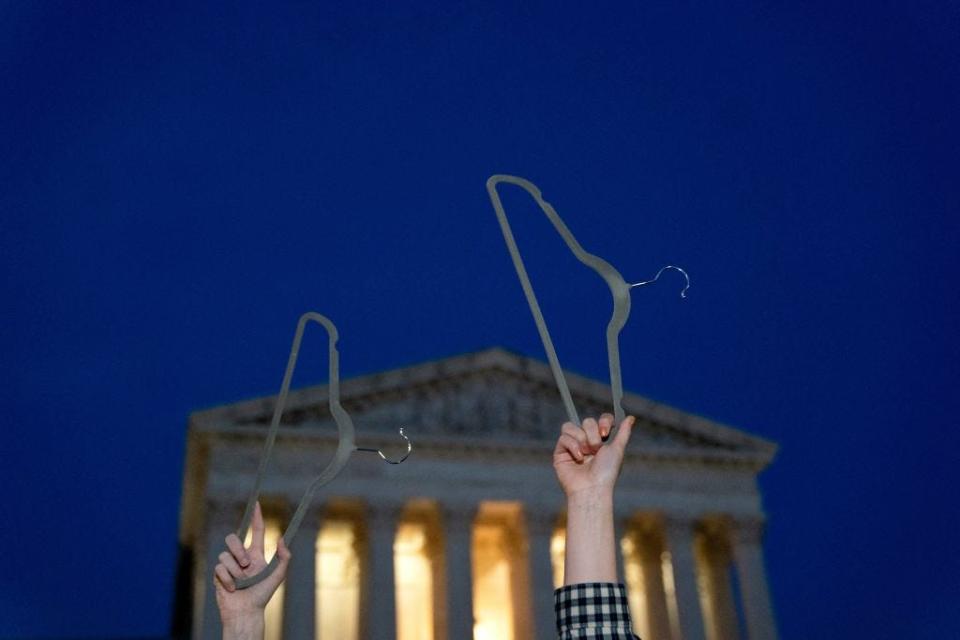
While some in the reproductive health care field are pushing to deemphasize coat hanger imagery, Nestman said, she sees the image as an homage to the many activists and researchers who paved the way toward abortion access and contraception.
With last month's ruling, she said, that fight continues, which is what spurred her to get her latest pro-abortion-rights tattoo. She plans to get another this summer.
"It's another pivotal moment in this fight, knowing I need to do something to keep me going," Nestman said. "It's to remind me that this is a long game and that I can only control what I can control, doing what I can in Pennsylvania."
Embracing body art in support of abortion access
In Dallas, where Lady Magnolia Tattoo plans a pro-abortion-rights benefit event this month, tattoo artist Andrea Patterson has prepared a sheet of 10 designs, including a heart reading “Pro Choice,” a uterus with a smiley face and a bead-like design reading “Rosaries Off My Ovaries.”
“Whether or not you want to get an abortion, there are still people who need it and it’s not anybody’s say,” said Patterson, 31. “The idea of people going about it unsafely just turns my stomach.”
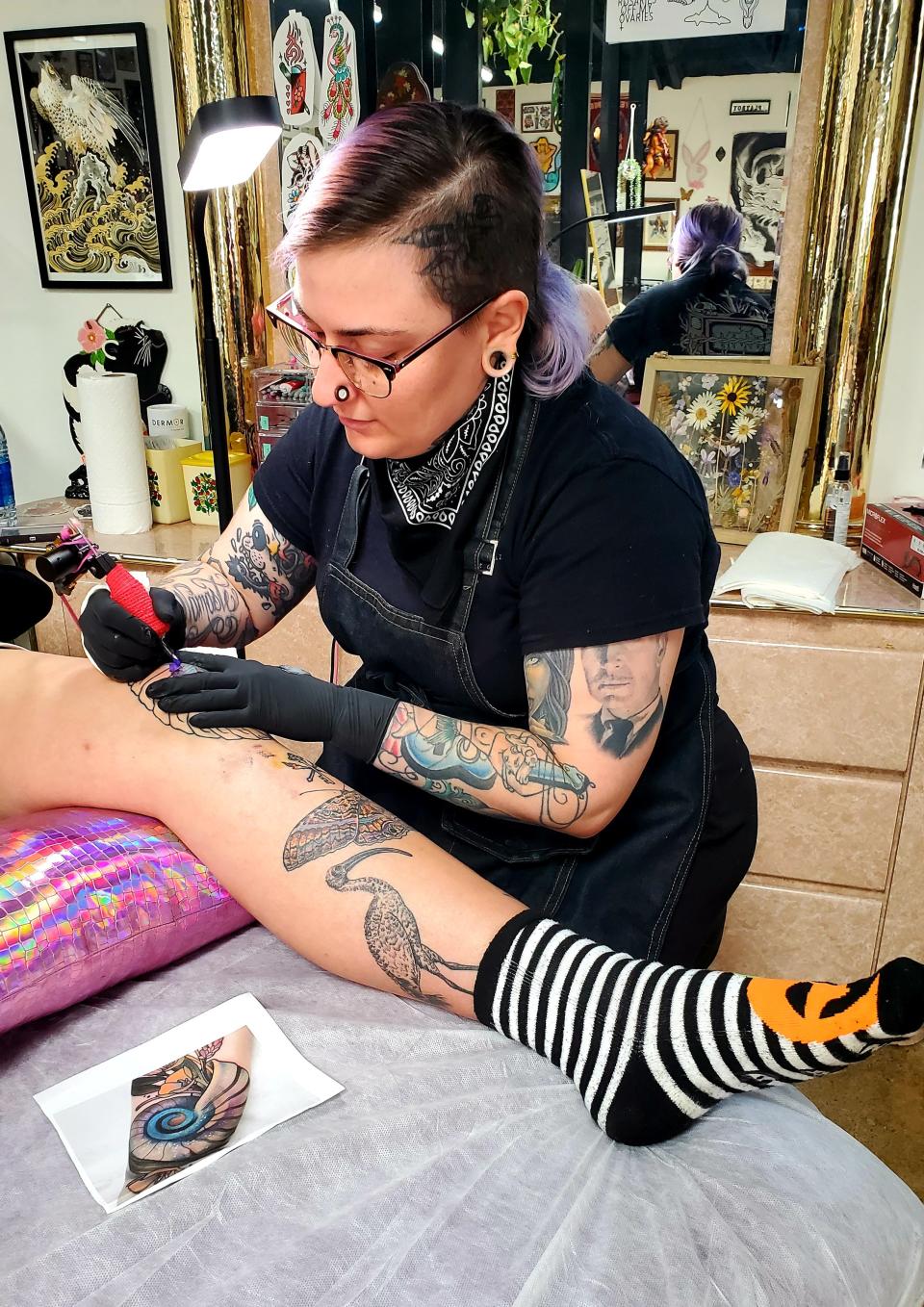
Patterson’s passion for abortion rights began early after her grandmother told her of her own experience as a younger woman.
“She told me that the first time she had sex, she got pregnant and went to Galveston to have an abortion,” she said. “But the person butchered it and didn’t get it done right, so she had to go to the hospital for a week before she passed the fetus. She told me that when I was, like, 12 or 13 – so it kind of stuck with me.”
The Supreme Court ruling made Patterson angry, and more than a little sad, especially knowing that other members of her extended family have had abortions for various reasons.
“I’ve definitely cried a lot,” she said.
She hopes the tattoos will help destigmatize abortion, provide people with a sense of solidarity and allow them to express themselves in a meaningful way.
“I hope it brings more awareness and that financially we can make some difference,” she said.
Others, like Jasmine Ramirez of Danielson, Connecticut, started offering tattoo art last year as more restrictive abortion laws were being passed in statehouses throughout the country.
Nearly a year ago, the tattoo artist organized a solo flash sale featuring pro-abortion-rights designs at Sinful Skin, the shop where she works in Danielson.
"Plain and simple, I don't think anybody should have the right to tell me what to do with my body," Ramirez said.
The 30-year-old had announced the event on her Instagram page: “I've never really been the activist type, but I am truly sickened by these new abortion laws being passed,” she wrote. “These new laws aren't about saving children, they're about controlling women and it needs to end!”
Though she’s grateful to live in a state where those rights are supported, she knows other women aren’t as lucky.
“It was a small effort to say I contributed in some way, to know that I did my part because it’s scary thinking how people can believe that it’s OK to take these rights away,” Ramirez said. “I felt it was important to do something.”
In all, she did seven tattoos that day, raising more than $400 for the Connecticut Women’s March in support of reproductive rights. Her most popular design was A Don’t-Tread-On-Me-style snake in the shape of a uterus.
“People were messaging me even after the sale wanting to get the designs,” Ramirez said.
At a time when so many upset by the Supreme Court decision are seeking ways to vent, Ramirez sees such tattoos as expressions of pride and self-determination.
“Being pro-choice isn't about being pro-abortion, it's being pro-minding-my-own-damn-business,” she posted after her flash-sale event. “I am so proud to be a woman and I am so honored to be able to make a difference as a tattoo artist. “
She said the shop hopes to stage another similar event, confident that the response would be positive.
"People are really pissed off," Ramirez said.
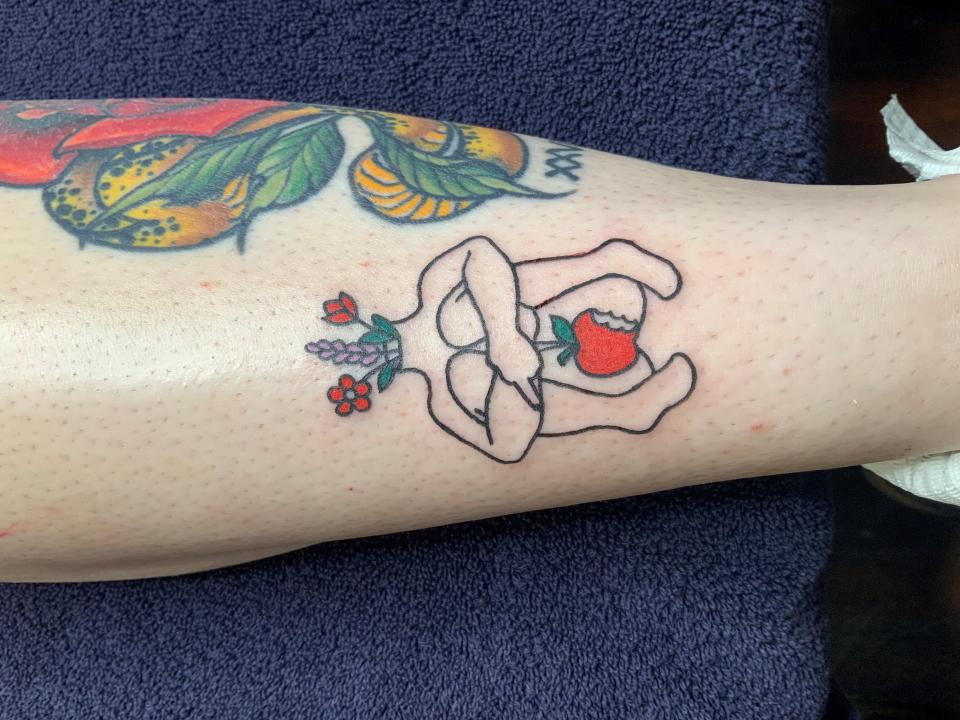
'It was a reminder to me of why I do what I do'
For some medical providers, the Supreme Court ruling is not the first time they've turned to tattoos.
In 2016, Dr. Gillian Schivone, a board-certified obstetrician and gynecologist in St. Louis, was among hundreds of reproductive health physicians attending the National Abortion Federation’s annual conference in Austin.
Fired up by regulations that had prompted half of Texas' abortion clinics to close, she and several colleagues decided one night over dinner to do something to voice their frustrations. The next day, each of them got a coat hanger tattoo, an experience that brought them closer.
“I just wanted a reminder of why I do the work I do, especially when times get difficult,” Schivone said. “We can’t go back to a time when people were dying from unsafe abortion.”
Schivone's tattoo, on her foot, is not readily visible, meant mostly for herself rather than other people – not that she’s secretive about her profession. She’s vocal about her work as an abortion provider, “so tattoo or no tattoo, people are going to know what I do.”
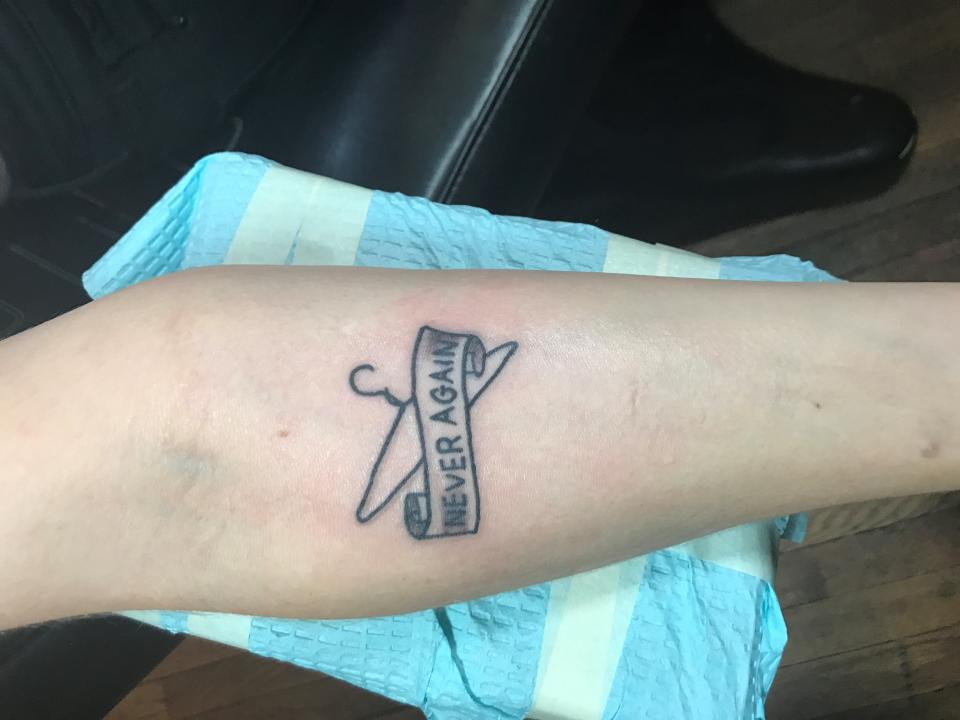
For Pittsburgh physician Colleen Krajewski, the decision to get a pro-abortion-rights tattoo came in 2016, when Donald Trump was elected president. She said she and many of her reproductive health colleagues saw the writing on the wall: A conservative Supreme Court would likely mean the overturning of Roe v. Wade and, for many, the end of legalized abortion.
A month later, frustrated and angry, Krajewski, an obstetrician and gynecologist, decided to declare her support for reproductive freedom by getting a tattoo on her right forearm of a coat hanger with the words “Never Again.” It symbolizes a pre-Roe time when the instrument was used in dangerous attempts to perform illicit abortions, she said.
“It came from knowing that the road ahead was going to be really hard, that there would be times when I was going to burn out and that I wouldn’t want to fight the good fight anymore – but that if I did, there would be consequences,” Krajewski said. “It was a reminder to me of why I do what I do.”
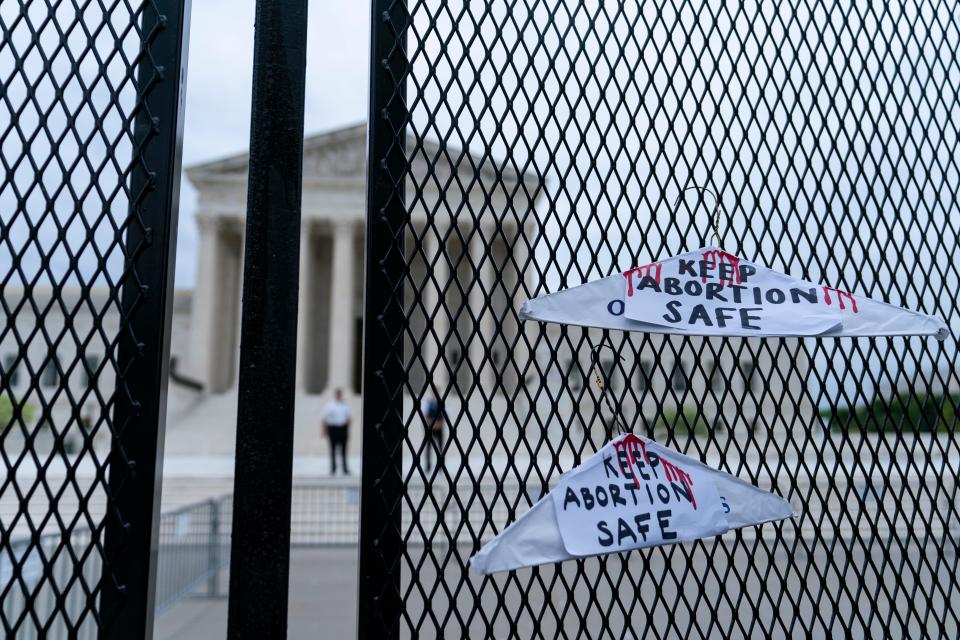
Both physicians noted that with the advent of the abortion pill, the landscape is not as scary and dangerous as it was before Roe, when many turned to coat hangers or other risky methods rumored to be effective, such as obscure herbs or bleach, to induce abortion. That's one reason many in the field want to deemphasize the coat hanger imagery.
“We have safer ways to self-manage abortion than we did pre-Roe, and that’s super-important for people to know,” Schivone said.
Krajewski also said she wants women to know coat hanger abortions do not need to be in their future.
“We are going backward in many ways, but we are not going back to coat hangers,” Krajewski said. "That’s not to say we didn’t fight and write our congressmen and do what we could, but still, here we are. And that’s quite sobering.”
'I need to something to keep me going'
While having pro-abortion-rights designs tattooed on one's body can be curative, so, too, can creating them: One of the designs Bennett, the California artist, created for last week's event featured a girl with flowers growing from her head and, between her legs, an apple with a bite taken out of it. As someone who was raped as a teenager, Bennett said, the image holds special meaning.
“Our bodily autonomy is being stripped from us,” Bennett said, and while the pain and rage she has felt has made her feel like a drop of water in an ocean, “if I can help people express how they feel on this subject through tattoos, that will help me feel less like I’m drowning.”
That’s the kind of comfort Nestman, the reproductive health specialist in Pittsburgh, said she sought through her body art. In addition to her coat hanger and vagina tattoos, she plans to get a third image this summer – a design she said will be in the dreamy rainbow style of a Lisa Frank cat.
“With everything happening this last week with Roe, it’s just knowing that I need something to keep me going, to remind me that this is a long game,” Nestman said.
That includes contributing to abortion-rights advocacy organizations and working to elect supportive politicians, she said.
Her work in the reproductive health field, she said, had never pleased her grandmother, a tea party Republican who staunchly opposed abortion but who had nonetheless arranged an illicit abortion for her daughter – Nestman’s mother – in the early 1970s, before Roe v. Wade.
She got her coat hanger tattoo a month before her grandmother died of Parkinson’s disease.
“The last time I saw her, she was completely nonverbal,” Nestman said. “But when she saw the tattoo for the first time she just lit up. She knew this work was what I was going to be doing. At that point, politics aside, she knew this was an important thing for people to have access to.”
This article originally appeared on USA TODAY: Pro-abortion rights tattoos help activists vent anger, ease grief


